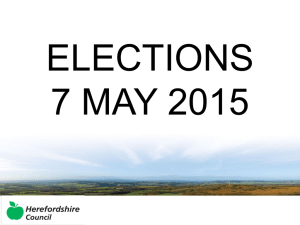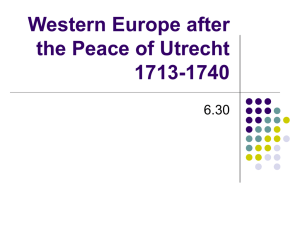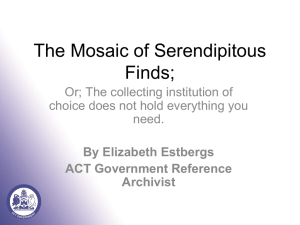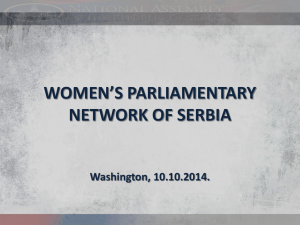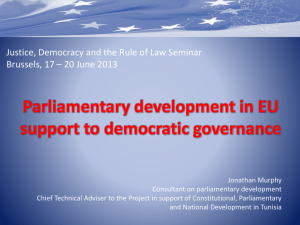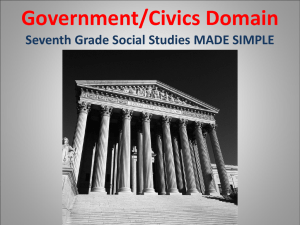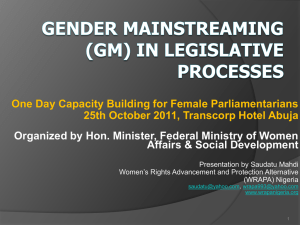Parliamentary Research and Studies Experience at the Federal
advertisement
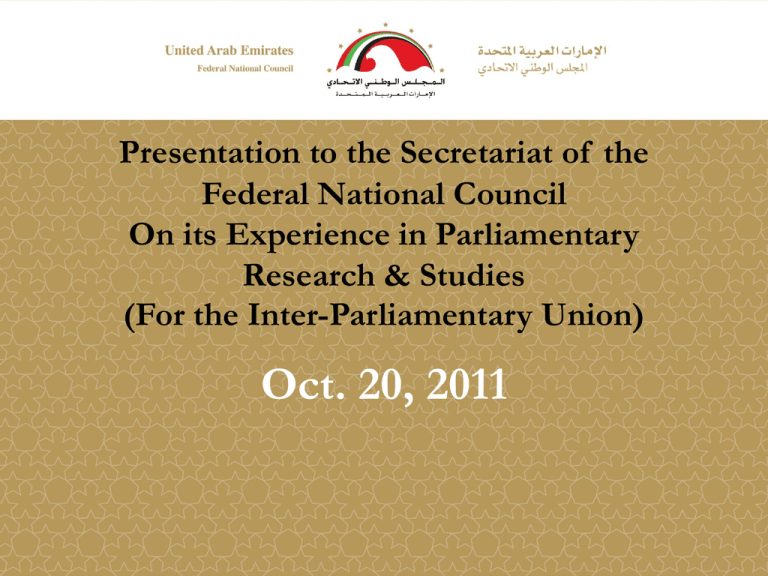
Presentation to the Secretariat of the Federal National Council On its Experience in Parliamentary Research & Studies (For the Inter-Parliamentary Union) Oct. 20, 2011 The distinctive experience of the Federal National Council in the development of parliamentary studies & research is based on a specific scientific approach, namely the Parliamentary Knowledge Management Approach, which means the utilization of technology and human resources to collect, manage, disseminate and invest knowledge, or manage the skills of the FNC researchers based on parliamentary knowledge so that they assume their role in providing technical support to members. According to specific frameworks, which are: 1. Maximize the efficient use of human resources to researchers through brainstorming 2. Use the Parliamentary Knowledge Management to achieve the objectives of creativity. 3. Distribute and use parliamentary information to achieve the best possible performance. 4. Networking of skills in the Federal National Council. 5. Employ and analyze information received by the Parliament. The Challenge How model application can achieve the parliamentary knowledge management approach The Arab parliamentarians were of the opinion that, to meet this challenge, it requires that the Federal National Council adopts the concept of "learning organization". That is, we have to seek continuously in the FNC to maximize the learning process of researchers within gradual and integrated scientific methodologies, taking into consideration that it is the only way to provide the researchers with significant models and new ways of thinking. Primary Components of Knowledge Management Approach 1. Concepts (Teaching ideas - means - mechanisms used internationally in parliamentary research and studies and adapting same in line with the environment of the Federal National Council). 2. Competence (Developing the skills of researchers) 3. Connections (with NGOs, the process being called Social Investment and Creation of Social Value for the Parliamentary Knowledge) This is achieved through: Information Technology Parliamentary Knowledge Management Telecommunications Technology Social Communication Management, with the members & government Commencement of Execution • • • After agreeing on all the previous frameworks. An Arab parliamentarian expert was assigned with transforming these concepts into working tools. A program was produced, in addition to a plan of action, and another operational, which can be summarized as follows: 1. Parliamentary Content: In each content, defining the parliamentary scientific methodologies to be used Parliamentary Content for Parliamentary Diplomacy Political analysis approaches Parliamentary Description Approaches Supervisory Parliamentary Content Governmental Policies Analysis Approaches Problemsolving Approach Legislative Parliamentary Content Analytical Approaches of Laws Legislative Inductive Approach In the three contents, we have applied the operations research methodologies and in the parliamentary knowledge management framework on several levels: 1. Theoretical training lectures 2. Scientific training programs 3. Holding intensive workshops 4. Taking into account the gradual learning principle 5. Generating a technical evaluation of researchers that begins with Assistant Researcher and ends with Senior Researcher 6. Generating models to assess technical work by members 2. Technology It was important that this technical development be accompanied by the development of parliamentary technology. Therefore, the FNC Secretariat hastened to generate may many software such as: • Technological Information Cycle • Technical Support Program for FNC presidency during the meeting • Technical Support Program for FNC members during the meeting • Parliamentary thesaurus 3. Parliamentary Operations This Plan has three primary branches: Parliamentary Branches Planning for Committees Meetings Pre-meeting During & Post-Meeting Types of reports: Detailed, Objective, Status Planning for General Session Meetings Support mechanisms for holding the meeting After adjournment of meeting Planning for Parliamentary Diplomacy Works Prior to participation During participation After participation 4. Forming Advanced Parliamentary Knowledge This is achieved by undergoing scientifically-systematic stages for development in the field of parliamentary studies and research through a number of bases: 1. The ability of researchers to actually use these papers and studies and to measure their comprehensive capacity. 2. The ability to achieve the targeted results through the methodology of results-based management. 3. Planning to reach further stages after succeeding in attaining a planned objective. 4. The peculiarity of the experience in terms of innovation, the ability for renovation, and most importantly, adaptation to internal and external environment of the FNC. 5. Encourage the researcher morally and materially in the context of FNC circumstances and potentials considering that he is an intellectual capital Basic Constituents of the Experience: Reliance on Mechanism & Technique of Symbiotic Training: 1. i.e., association of the parliamentary expert with researchers on constant basis 2. Establish the parliamentary information center 3. Establish a division of parliamentary research and studies in each technical department of FNC 4. Establish the technical office subsidiary to Secretary General 5. Establish the parliamentary leadership committee composed of the secretary and assistant secretaries with the aim of reviewing results and discussing difficulties and problems Experience Results 1. Improve the technical support service for members. 2. Increase the efficiency of parliamentary operations. 3. Adopt the concept of research creativity. 4. Activate the parliamentary knowledge and intellectual capital "researchers" to improve members’ access to technical support. 5. Create a new generation of parliamentary researchers, capable of protecting the experience in the future. Practical results achieved through the 14th Legislative Chapter First: Committees research and studies Second: General sessions research and studies Third: Parliamentary Division research and studies Fourth: Legal Studies Fifth: Background information on FNC Information Center Thank you for your Listening

